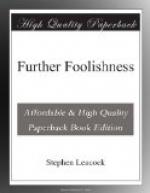“A young subaltern once met the Duke of Wellington coming out of Westminster Abbey. ‘Good morning, your Grace,’ he said, ‘rather a wet morning.’ ‘Yes’ said the Duke, with a very rigid bow, ’but it was a damn sight wetter, sir, on the morning of Waterloo.’ The young subaltern, rightly rebuked, hung his head.”
Nor is it only the English who sin in regard to anecdotes.
One can indeed make the sweeping assertion that the telling of stories as a mode of amusing others ought to be kept within strict limits. Few people realise how extremely difficult it is to tell a story so as to reproduce the real fun of it—to “get it over” as the actors say. The mere “facts” of a story seldom make it funny. It needs the right words, with every word in its proper place. Here and there, perhaps once in a hundred times, a story turns up which needs no telling. The humour of it turns so completely on a sudden twist or incongruity in the denouement of it that no narrator, however clumsy, can altogether fumble it.
Take, for example, this well-known instance—a story which, in one form or other, everybody has heard.
“George Grossmith, the famous comedian, was once badly run down and went to consult a doctor. It happened that the doctor, though, like everybody else, he had often seen Grossmith on the stage, had never seen him without his make-up and did not know him by sight. He examined his patient, looked at his tongue, felt his pulse and tapped his lungs. Then he shook his head. ’There’s nothing wrong with you, sir,’ he said, ’except that you’re run down from overwork and worry. You need rest and amusement. Take a night off and go and see George Grossmith at the Savoy.’ ‘Thank you,’ said the patient, ’I am George Grossmith.’”
Let the reader please observe that I have purposely told this story all wrongly, just as wrongly as could be, and yet there is something left of it. Will the reader kindly look back to the beginning of it and see for himself just how it ought to be narrated and what obvious error has been made? If he has any particle of the artist in his make-up, he will see at once that the story ought to begin:
“One day a very haggard and nervous-looking patient called at the house of a fashionable doctor, etc. etc.”
In other words, the chief point of the joke lies in keeping it concealed till the moment when the patient says, “Thank you, I am George Grossmith.” But the story is such a good one that it cannot be completely spoiled even when told wrongly. This particular anecdote has been variously told of George Grossmith, Coquelin, Joe Jefferson, John Hare, Cyril Maude, and about sixty others. And I have noticed that there is a certain type of man who, on hearing this story about Grossmith, immediately tells it all back again, putting in the name of somebody else, and goes into new fits of laughter over it, as if the change of name made it brand new.




